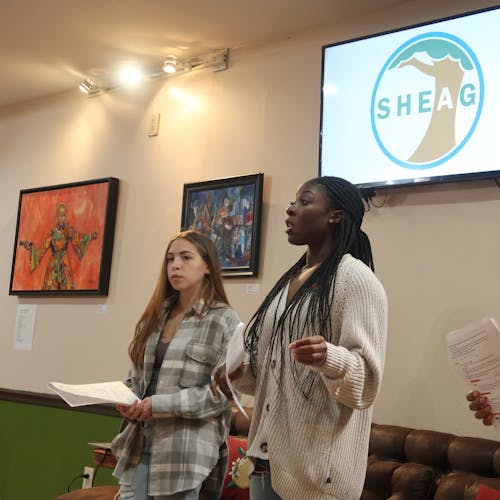Students raise concerns about exam web tool ProctorTrack

Students registered for online classes in the Mason Gross School of the Arts for the spring semester are coming face-to-face with ProctorTrack, the recently-launched service that asks students to scan their faces, IDs and knuckles via webcam to prevent cheating on online exams. ProctorTrack commands an additional student fee of $32, in addition to the mandated $100 convenience fee.
ProctorTrack, which debuted on Jan. 6, promotes itself as the “only fully automated remote proctoring solution,” using only the beady eye of the student’s webcam to maintain the integrity of taking exams in a largely unregulated environment.
The move is one in accordance with the United States Department of Education’s Higher Education Opportunity Act of 2008, which requires colleges and universities with distance education programs to have mechanisms in place to ensure academic integrity, said E.J. Miranda, University spokesperson.
Under the act, he said it is within the authority of all colleges and universities to implement secure log-in usernames and passwords, proctored exams and identification verification technologies as they become widely accepted. Currently, Rutgers implements programs Examity and ExamGuard in addition to the newly adopted ProctorTrack.
The identification verification technologies adopted by colleges and universities, as stated by the DOE, are expected not to infringe on students’ violation rights, he said.
But ProctorTrack, a tool Miranda called affordable, versatile and compliant with the Americans with Disabilities Act of 1990, is raising considerable skepticism among students and faculty alike.
Pavel Mishin, a School of Arts and Sciences sophomore enrolled in an online section of “Dance Appreciation,” said he only spotted the notice for ProctorTrack when he was combing through eCollege, the online learning platform for Rutgers.
Not all students are aware of the $32 fee, nor that ProctorTrack is not compatible with the operating system Linux, he said. And for the students that lack a webcam, like Mishin, among other issues concerning big data, resentment toward the program continues to grow.
Student discontent with ProctorTrack manifested itself into a petition on change.org.
The mandatory ProctorTrack software is “infuriating,” the petition read.
“On an even more serious note, I certainly thought that the delicate issue of privacy would be more gracefully handled, especially within a school where the use of webcams was directly involved in a student's death,” said the petitioner, Betsy Chao, a School of Arts and Sciences senior. “As a result, I thought Rutgers would be highly sensitive to the issue of privacy.”
The ProctorTrack software does not access any of the files on a student’s hard drive except for the audio, video and screenshots recorded during an exam, the Rutgers administration said in a recent announcement in response to student controversy.
Student webcam videos during exams are not streamed live to anyone, according to the announcement. The videos are only captured and stored locally until they are uploaded in pieces to ProctorTrack servers for automated analysis.
Once student data is captured and uploaded to ProctorTrack’s secure servers, the notification said the information is analyzed automatically by algorithms to identify any possible anomalies or breaches to test policies.
In the case of test policy breaches, the data relevant to those breaches are sent to the instructor, and stored at the University learning management system, or the LMS, according to the announcement. All student data is automatically deleted from ProctorTrack servers within 30 to 60 days of the final exam of the course.
At this time, the announcement said students would get an email notification confirming that all proctoring data has been permanently purged from the servers.
Still, opponents of the program continue to raise questions about ProctorTrack’s efficacy.
“From my point of view as an instructor, I don’t see the appeal at all because I don’t see how it could possibly curb cheating for someone dedicated to cheating,” said David Black, a third-year graduate student and teaching assistant in the Department of Philosophy.
And students have taken it upon themselves to demonstrate just how ProctorTrack can be bypassed.
Test takers can intercept the video feed to project a modified or replaced scene, trick ProctorTrack with pre-recorded video, tape the test material directly behind the computer screen or otherwise simply wear sunglasses, according to a blog post on madebyknight.com.
Students that feel uncomfortable being recorded while taking an exam can work with their instructor to arrange an alternative way to take an exam, either by coming to campus to take a live, proctored exam or taking the exam in a traditional classroom setting, Miranda said.
The University understands that this new approach for the University to meet government standards may take time, according to the announcement released by administration.
“The goal of using ProctorTrack is to always provide the student a safe, simple and secure method for taking an online test anywhere, at any time in the privacy of one’s own space, while ensuring we protect and preserve all student data that we collect.”
Katie Park is a School of Arts and Sciences junior majoring in Political Science and Journalism and Media Studies. She is the News Editor for The Daily Targum. Follow her on Twitter @kasopar for more stories.



